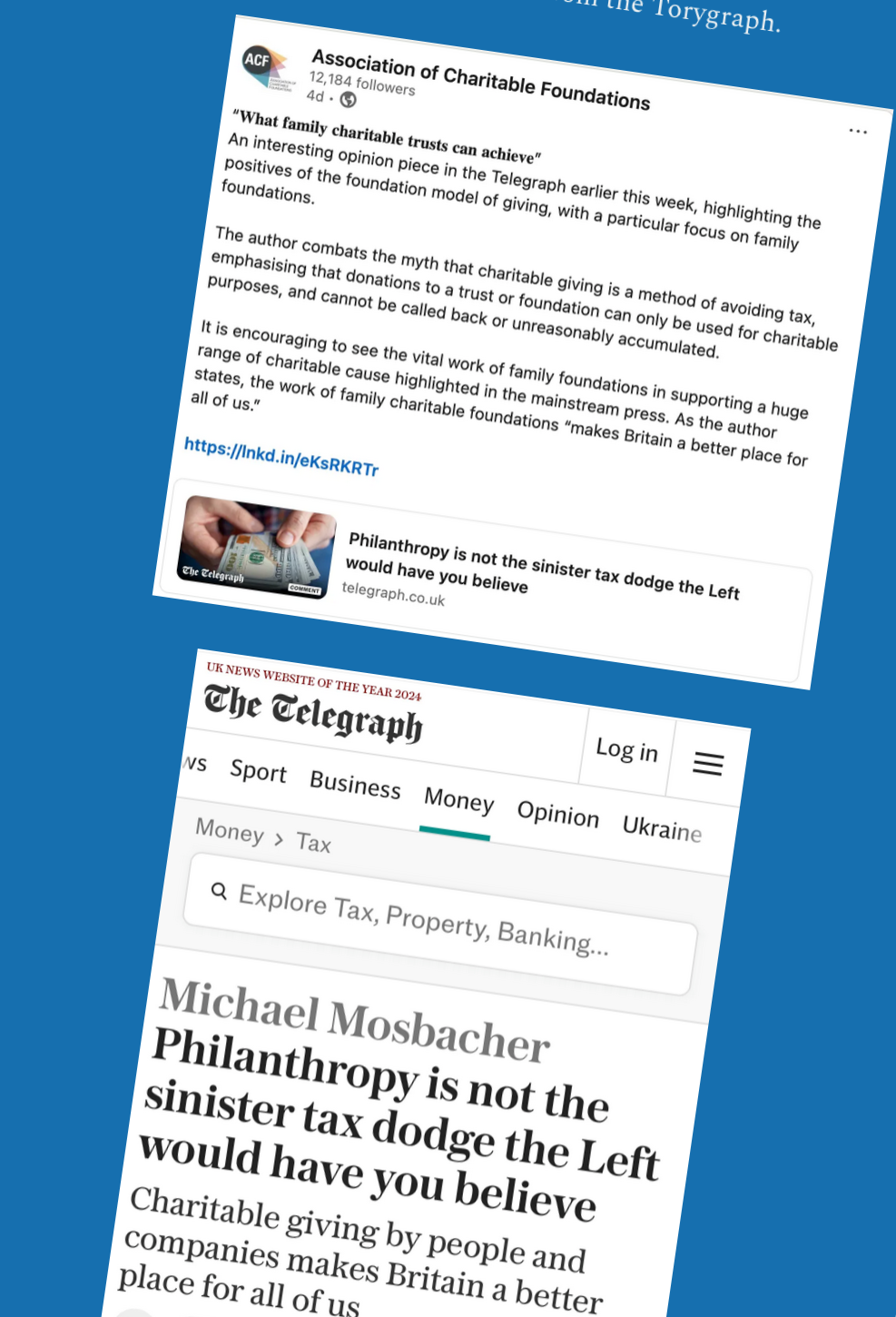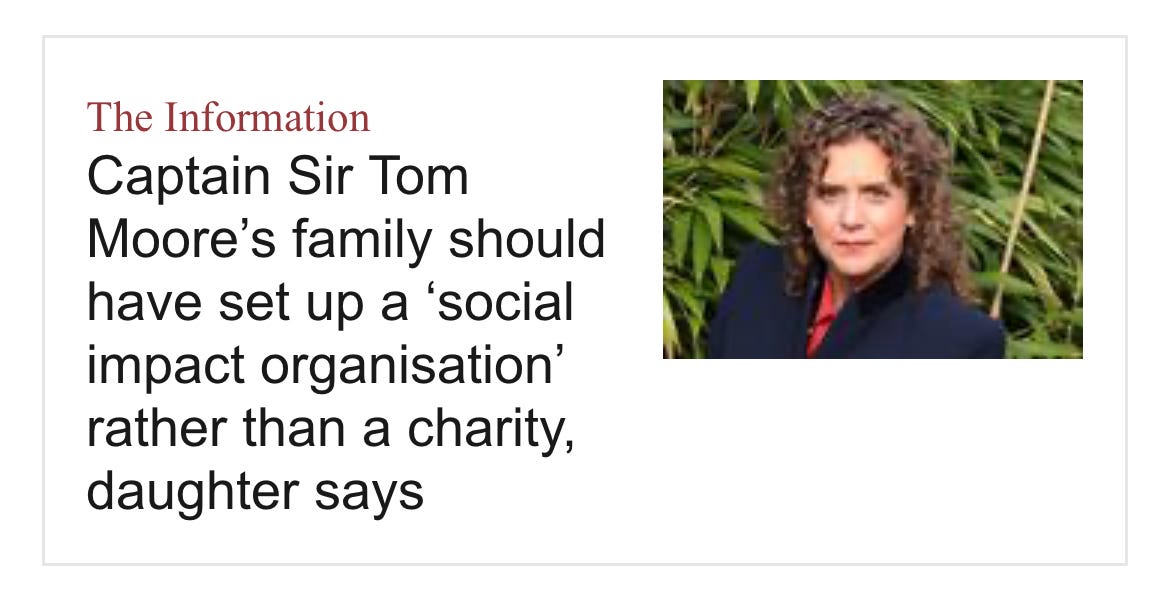Growing philanthropy? Or shrinking state?
We may be missing the point about UK philanthropy. And why ideology is not just about ‘bad people’.
The not remotely funny personal bit
I’ve been weirdly superstitious and anxious about posting this today (Friday 13th) so fingers crossed this isn’t the day a philanthropist takes out a hit on me.
So I took a break from biweekly blogging while I went off to Gdansk. You may have seen my holiday snaps on LinkedIn. Yes, I know, why am I posting holiday snaps on LinkedIn?

And indeed why am I posting them here? And why on earth did I go to Gdansk?
Well, first, weird reason: in about 2000 I found a book in a charity shop in Brighton about Gdansk. It just looked magical and unexpected. At the time I was actually writing about the fall of communism, Gorbachev, and the rise of Putin and new authoritarians so it went on the back burner - but stayed on the list. We got round to it 25 years later.
Here comes the politics
But it goes beyond that. I’ve always liked travelling in Central and Eastern Europe. (For one thing, I love it when people actually throw the food at you in a cafe.) They’re fascinating because they’re a huge reminder of the volatility of history and how quickly things can change absolutely. It’s a reminder that whole political systems can stand and fall in a matter of a generation - twice. After the fall of the Wall we were all told of Fukuyama’s famous ‘End of History’. But that always seemed very odd: wasn’t the evidence right there in front of us of how quickly and absolutely things could change? If the wall could fall, that was always a sign that it could go up again.
That turbulent history is also of course a warning to all of us of what is never as far away as we think. As I looked at the World War II museum with its examination of the Hitler cult, posters of Mussolini, and indeed, evidence of the day to day dehumanisation of various groups (not just the holocaust: the sheer breadth of war atrocities is something we rarely discuss now), the parallels with changes in our own society were deeply disturbing.
For a Brit, looking at a truly world war - not the story of plucky little Blighty against the Hun, as if it started with the invasion of Poland - the idea of a whole world wracked by war, the slow pollution of authoritarianism, and the rise of imperial ambitions after a brief respite, was pretty sobering. Yes, we know these things and chatter about them in the Guardian. But we also sort of don’t. One thing I find remarkable is people’s unwillingness to consider the real possibility of potential military attacks directly on the UK - not to mention the cyberattacks, long since begun.
But there is hope in the Solidarity museum, whih commemorates the downfall of Soviet authoritarianism, and the tremendous mobilisation of the population to a single goal. Prior, sadly, to its replacement by hyper-capitalism and rampant inequality. As I left, the country elected another right-wing populist thug.
If nothing else, it’s all a reminder of how much can change in the span of, for example, my own lifetime. If this makes us fearful - and it should - it should also remind us that history is always to play for. Things can change. And we make that history - albeit not in ‘conditions of our own choosing’ as a certain beardy dude once said.
Growing philanthropy is a sign of societal failure
I had to take a deep, rather shaky breath when Civil Society published this story this week. In fact, I had already prepared a LinkedIn post warning that philanthropy infrastucture bodies were about to do a data-backed charm offensive. But here it was:
Government no longer largest source of grant income to charity sector, data reveals
Charitable foundations and donor-advised funds gave more in grants to charities than the government and National Lottery’s distributors for the first time last year, according to new data.
Estimated figures released today by 360Giving’s UKGrantmaking platform show that funding from trusts and foundations increased by 12% year-on-year to £8.2bn in 2023-24.1 (Civil Society)
So, lots of celebrating the increase in trust and foundation giving. A sign of growing generosity and increased collaboration. 360 Giving’s data is a key enabler of more 'impactful' giving. And philanthropy's growth is a reassuring development during a time of pressure on the sector.
Excuse me for a moment.
Polite round of applause for trust and foundations
Before I go any further, a polite round of applause for 360 Giving - fantastic site, can’t believe how technically impressive it is. And also a little clap for trusts and foundations. They do good work. Many of the professionalised ones are full of right-thinking people who want to help. They are doing so in a failing system. They are trying to help, and do.
Trusts and foundations have faced unusually public criticism this year, much of it from freelancers who, untethered to institutions, have been candid about failings in the sector. But in response, we’re seeing a wave of reputation management - but the narrative being pushed is a bit of a side-step. No one said that foundation funding had declined; what people have raised is the poor handling of funding shifts and the resulting disruption. Rather than engage with these critiques, some are presenting its growth alone as proof of success.2
But my concern is broader. I’m worried about how this may contribute to the narratives of generous philanthropy which are being used for political purposes.
Back to the news
Looking at that news again: do you find this reassuring? What does this tell us about the decline in state responsibility? What does it tell us about the significant falls in individual giving precipitated by the cost of living crisis, increasing inequality and inflation? Do we want to be America? Do you want to crowdfund your liver transplant?
What worries me is not really the giving: nobody wants to turn down money in this climate. What worries me is the story this will be used to tell. In reality, the details are complex: contract income from Governments is no doubt a different story . But I’m quite sure the happy narrative is being pushed to the Telegraph as we speak.
In a world where the voluntary sector was voluntary, I would see this as par for the course and perfectly okay (although I would still ask how that wealth had been amassed and how it was in the control of so few people). But the voluntary sector is not voluntary - much of it’s essentially coerced into action by the failings of our social welfare system and the gradual and ever increasing inequality caused by the fiscal system we have deliberately chosen since the 1980s. While the news can be touted as a triumph for philanthropy, we can also see this as an example of distraction from the deep inequality in our society. The cheerleaders of the system - culturally, not consciously for most - prop this up.
Overall, there is a constant danger in ‘philanthropy’ that we normalise and legitimise the rise of private power in our care for each other as something to be welcomed, or at least calmly absorbed. This is not progress: it’s a symptom of political and social retreat.
There have been several attempts recently to protect the legitimacy of philanthropy, and there is an ongoing push to demonstrate the great largesse of the wealthy. You may remember this from last issue:
But some of this is strategic. For example, much of the concern behyind the scenes is about avoiding regulation - you may have noticed (or not, given it’s extremely niche) there have recently been resurgences of questions about the introduction of minimum levels of giving from trusts, partly as a result of the discussions and concerns in the US over the use of foundations to hoard cash - or use it for purposes far less charitable than they first appear. As Cohen notes, there seems to be a rise in donor-advised funds - we might note, just as they come under scrutiny in the US for their often highly dubious status.3 Completely secretive, they are being widely used to funnel into ‘culture wars’ work - and no, not on the right side…. I’ve shown elsewhere trusts seeming to actively campaign against leaseholders’ rights, to preserve their charitable giving - but what else, and who else, does that protect and preserve?
You’ve also seen wider demands for wealth taxes across society. These kind of discussions are not as unconnected as they may seem - even if some of the biggest and oldest trusts and foundations are not connected directly to personal or private wealth any more: while those making the arguments may not directly connect them, they are part of the general debate and cultural discourse about the power of capital to use its wealth as it sees fit. They speak to the power of elites and class interests in our societies.
Our stories do not exist in isolation
Keir Starmer set out his stall on philanthropy and its role in saving us all before the election. Many, including me, were excited about him suddenly ‘listening’ to charities at the Pro-Bono Economics/ Lloyds Foundation summit. But the point is, he wasn’t just ‘listening’ to charities. He was wooing philanthropists. As I warned at the time, the danger was that philanthropy would yet again be used to subsidise - or enable - a shrinking state.
Let me remind you again of Iain Duncan’ Donuts’ Centre for Social (Victorian) Justice and their plans to ‘Supercharge philanthropy’, in a report published last year. The report featured a barnstorming foreword by 30 of the UK’s ‘top philanthropists’, with captains of industry and aristocracy telling us that they “stand ready to respond” to the challenges faced by the UK and to “propel the nation forward”. They harkened back to the proud history of “innovation being driven by philanthropic giving - from the great philanthropists of the Victorian age through to the present day”.
But the moment that the real driver was revealed was when they told us that ‘Philanthropy can do far more than the sum of its parts, taking risks and driving innovation in a way that taxpayers’ money cannot.’ This is breathtakingly unsubtle. At a time when we’re facing punitive cuts in the welfare state, gutting international development budgets, and have made substantial increases to taxation for working people (however indirect), it’s all the more important that such philanthropists make clear that they are only to happy to give voluntarily. All of our stories take place in the context of a wider ideological battle over how we fund the care our society needs.
So, well done to trusts for getting it out there. And again, congratulations on the data. But what it tells us - and what it may be used to say - is something to be treated with deep suspicion and a level of cynicism.
Acknowledgements
A big thank you to Liz Gadd for her LinkedIn post on the news story, and the ensuing comments which helped me think through the issues here. You’re exactly right: nobody is asking the right questions.
Bad systems do not mean bad people
As my recent biweekly arguments in the LinkedIn comments with someone I really respect keep emphasising, no part of my critique of philanthropy over the last few months has been about ‘bad people.’ (Nigel Farage is bad people. Oh and the philanthropy tech bros too - they are actual psychopaths. But, you know, a grants manager at, say, Esmee Fairbairn ain’t.) Systematic critiques of ideology just aren’t about that. The theoretical underpinnings of my arguments, for those interested, are Marx, Gramsci, Foucault, Mark Fisher, Althusser (unfashionable these days) and a lot of Frankfurt school - especially Marcuse. None of them argued that our society takes wrong turns because too many people are meanies, or there is a nefarious conspiracy to do over poor people. (But there are those too - and outright class war is becoming more obvious in politics…)
It’s a twofold thing: the first is that our society acts on the basis of our beliefs, shaped by ideology - the particular systems of right and wrong, common sense, unchallengeable truths, that we hold. We don’t come up with these ourselves - we’re given them. They’re not individual. They’re absolutely basic to how we see the world. Some of them are transmitted to us overtly - overt ideology (eg propaganda, religions etc) - and some covertly. When we say, ‘but of course everyone has to pull their own weight’, or ‘it’s better to teach a man to fish’, or ‘well they should have more money because they are cleverer or work harder’ maybe it’s overt, but more often it’s just covert. The shape of the world and how we see it has been shaped by all of the culture around us. Often that is shaped by economic systems of power.
Ability to shape those things and have them believed is one of the main sources of power for those who are in charge, economically or otherwise. And they will rigorously defend those ideas if you challenge. That’s why the ruling ideas are always those that support the ‘ruling class’ as Marx has it. It’s not brainwashing - that suggests we start with a brain that gets washed. Ideology really shapes our whole picture of the world. And you don’t need to be strapped to a chair. It’s in the stories you read, the things people say to you day to day in the street, the laws, practices and policies of everything around you. You’re ‘in’ it all the time. Louis Althusser talks about what he calls ‘Ideological State Apparatuses’ - social institutions, laws, media, etc, that help keep us all in line. At the time the State was where it’s at - now the media, corporations, workplaces take a hugely more central role, and power is much more in non-state hands. But the point is, those ‘apparatuses’ help reinforced what we all believe and make sure we learn the right ways of thinking. Some overtly, and some very subtly. You might say philanthropy as a practice and an industry is a type of ISA - it’s a practice, an institution, that participates in public discourse, helps to shape and enforce laws spoken and unspoken, trains and selects its members, and influences the behaviour of society. One of its key ideological functions - throughout its history but especially since the industrial age - is to promulgate the idea that the wealthy are so generous that taking their cash or equalising our society is unnecessary. ISAs are institutions or technologies that tell the stories, and enforce or reinforce behaviours. You can see, therefore, why I’m so concerned about the narratives in the charity and philanthropy sector: stories are where ideology gets made and transmitted.
ISAs are pretty effective at circulating and policing ideas. But even better for the most powerful people in society is that usually we believe these things so deeply we will actually reinforce them on our own account. We repeat and circulate them. Tell each other the same stories. Teach them to our kids (or cats on my case). Laugh at people who question them or call them nutters or extremists. (Even when they’re just saying the stuff half of the people in the Guardian say….)
So how do we break out of this? Well, Antonio Gramsci argues that, yes, the ruling ideas are always trying to assert what he calls ‘cultural hegemony’ (dominant influence over our ideas); but things change. We’re able to challenge them in our society, because faultlines and cracks appear. The stories at certain points don’t make sense. They especially don’t make sense for those of us on the sharpest end of the ruling people’s power (although it is amazing how much people can tend not to see this - eg. Latino migrants voting for Trump.) No ideology is ever absolute because we’re a creative and chaotic species. Some of us will be noisy and unwilling to refuse to question. And events happen which force some groups in society to question some of the fundamentals: look at how quickly our ideas about work shifted during COVID. New ideas are produced. Slowly fractures and cracks show in dominant ideas and ideologies. There is always resistance in ideas - this is part of the ‘dialectic’ nature of our culture. In a way, ideas themselves, as hard as they are pushed, can’t help but produce their own faultlines and contradictions.
Some people will always find those cracks and stick a crowbar in them. others will be out there frantically dabbing with a tub of glue and a copy of the Torygraph under their arm.
You’ll tend to find that these dominant and recessive/ resistant ideologies fight it out over time. For example, in the US, the progressive ideas about immigration as a benefit to society, or the idea that they are a dangerous drain on society. We very clearly see people battling this out for dominance in the realm of ideas and through stories. At a certain point the battle for ideology stops being covert and becomes very overt. Some might say that is part of the trick to making change - that part of our job, if we want social change, is to try and find the faultlines and break them wide open. I think this needs to be done with the stories we tell. (Alan Sinfield, wrote about this.)
Making the covert overt - calling it out and showing the constructed nature of those pictures of the world, the assumptions and deep beliefs we have, is really important. That’s what I spend a lot of time doing here: explaining the assumption and ideas that are behind some of the shittier things in our sector. And how those ideas help those in charge - both within and without it.
How exactly you make that cultural change is a long, long story - and interestingly, Gramsci has been co-opted by the right wing and the MAGA crowd as a template for how to overthrow the ‘dominant’ ideas they don’t like. (Like migrants or trans people having the right to exist.) File this under ‘things I did not see coming’.
Alongside this, coming back to the sector, and the idea of whether the issue is bad people: one of the biggest issues you will tend to find is that the ruling ideas of the ruling classes tend to select people who will uphold them. This is what Owen Jones points out his ‘Establishment’ book: you only get into certain positions of authority as long as you have swallowed - or can swallow - the dominant stories. It doesn’t have to be 100%. And small, incremental changes can happen - that’s how we see positive developments, however slow and sad and piecemeal in trusts and ofoundations. But it’s very, very hard to get power within the hegemony and ‘establishment’ if you don’t share and circulate their ideas.
In most kinds of industry, everybody is just doing their job. Me too. I do see staff and trustees in the larger, more institutional foundations sometimes genuinely baffled by critiques of philanthropy: they will do this thing of listening to the critique with a faint smile, like a benevolent Aunt listening to a toddler tell them about Polemon, and then repeat the established story back to you VERY SLOWLY so you can understand. And then others see it very clearly. (There are a lot more philanthropy abolitionists in the industry than you would think, by the way, mostly on the DL.) Other very common approaches are listening and then immediately suggesting a minor policy change and saying they are being ‘action focused’ or realistic. Take care: an appeal to ‘realism’ is one of the best ways to reinforce ideology (just ask Mark Fisher).4
So, the structures and systems of thought we all inhabit still sit within a wider system of wealth concentration and private control over public good. Philanthropy plays a role in reinscribing that. Our professional identities can always insulate us from recognising it - and certainly prevent us from publicly acknowledging it. And I fear that when we point to - or perhaps only ever see - the ‘good guys’ of philanthropy, we play a similar role to those who say ‘not all men’. It draws us away from the systemic issues by making the problem seem to be a matter of occasional bad practice as opposed to the structures themselves.
Also, time and again I meet senior people in the industry who have just never been on the other side other desk. Truly, they have no idea what is happening out there in other foundations - and what we are seeing. Again, systems and structures protect themselves: this is how hegemony works, and how ideology reproduces itself. What you don’t or won’t see is just as important as what you do.
So look. Try to think harder. When you hear someone say something that sounds ridiculous or ‘extreme’ in terms of philanthropy or charity, ask yourself why it is ridiculous. Ask what the underlying belief is. And ask where that came from - and who does it help? And remember, our beliefs about the world, the language we use, and all of the systems we inhabit are constructed by **us**. That means we can change them. But it does need education, openness to change, and a willingness to challenge ourselves - and be challenged - if we are in positions of authority. The biggest trusts and foundations have got much better at this in the last couple of years in areas like race and gender. But they are LIGHT YEARS behind on class.
Anyway that was pretty much the first year lecture I used to do on ideology from 2006, but with charities chucked in. Good to keep your hand in.
Next week….
As the financials triumphantly reported show, there are bigger fish to fry. I am starting to worry that we are only holding trusts to account because we think there is more chance they will listen than the people we directly democratically elect. those of us with political concerns in the sector need to start turning our attention to inequality as a whole - much as this system is very much part of that. And if funders really care: they will spend less time congratulating themselves and more time making a public fuss about inequality. Take a leaf out of Trust for London’s book.
I’m branching back out to wider social justice for a while, and thinking more about the problems we’re trying solve in charities - not the problems we have to deal with in getting cash. I’ve been really inspired by my work with Southwark Law Centre, and by seeing the campaigning work of people like the Good Law project, and, I have to say, Oxfam - never thought I’d say that. Let’s focus on what the right kind of civil society can achieve.
Next issue unknown but I have a Pride special up my sleeve about trans toilets. Expect a bit more focus on the society and politics side of the tagline. Stick around if you think there are more interesting things than other people’s money. I also promise to be funnier but no less grumpy.
Also - why not drop me a line?
Sometimes it feels a bit like this just flies out there into the void - although to around 4000 people a month! What do you think? Let me know in the comments!
And finally…
I recently posted on LinkedIn about how I was changing my mind positively about CICs. I used to think they stopped you getting access to money if you were genuine, or were a useful cover for those who wanted to appear charitable when they weren’t.
My view has changed a lot because the flexibility they offer now means they can be more agile and political than charities. When charity regulation is so conservative, they may offer a way to have a greater social impact.
And then, like clockwork, here was a headline in Third Sector this week.
The problem with every model is the sharp actors and the dickheads.
It’s a reminder that, while there’s a lot of talk at the moment about ‘social impact organisations’ and trying to broaden out definitions from ‘charity’, we have been through all this before: the ‘social enterprise’ bubble was part of the Big Society push to privatise social welfare again. Let’s not just end up with a load of A4Es hoovering up funds for profit. Much as the high level of charity regulation prevents politics (at least, if they are left-wing), it also does go some way to preventing people who just want to feather their own nests.
Barely Civil Society is trying to create deeper debate in the UK charity sector.
This blog nearly kills me every two weeks. oo Even if it is amazing what hyperfocus, insomnia and some research skills can produce. So can you help?
1. Subscribe
Barely Civil Society is a reader-supported publication. Please think about buying a coffee or even getting a paid subscription. It’s about a quid a week, for as many words as you get with most magazines. Or just send this on to your friends or mortal enemies.
2. Share
Linkedin recently changed its algorithm and is no longer showing posts for many VCS writers to a wide audience. (Unless you pay for advertising or want to post heartfelt stories about your emotional resilience or victim status…) Could you share this post on Substack, or social media?
OR….
3.
See https://www.civilsociety.co.uk/news/government-no-longer-largest-source-of-grant-income-to-charity-sector-data-reveals.html
Second: let’s be clear: not all trusts and foundations are the same. At one end, some of the larger, older foundations operate more like public institutions – with robust governance, structured grantmaking, and a degree of insulation from personal whim. At the other end are vehicles of live donors or family trusts, where control is centralised, transparency is minimal, and personal ideology often drives giving. And of course, there is major donor giving - the most clearly ‘voluntaristic’ of all - some of this, ‘private giving’ is not covered here, but realistically, most of that still goes through some kind of trust vehicle these days.
“What are donor-advised funds – and what’s the problem with them? DAFs channel huge amounts of cash to ‘culture war’ groups – anonymously.” Helen Flannery, Chuck Collins, Open Democracy, March 15th 2024. https://www.opendemocracy.net/en/5050/dafs-donor-advised-funds-charitable-giving-us-tax-deduction/
Btw, I’m not one of them - I think we need to make financial philanthropy,9 economically, materially irrelevant, not abolish it.











I have so many questions about the "foundations more than gov't" headline. I feel like I need to understand that better, is it definitional (such as gov't has more contracts than grants) or is it really austerity. I don't seem to have a spare minute to figure out. Did you find anything?
Is that true about LinkedIn? I’m definitely sensing a shift. My feed is devoid of all the interesting contacts and colleagues I used to see and is now peppered with ads for BlackRock and invitations to move to Dubai.